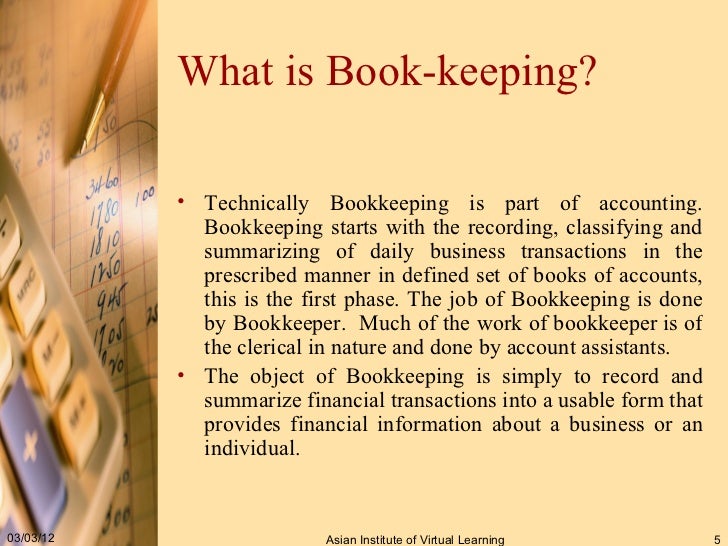

Retained Earnings, to track profits that are reinvested in the company for growth.Owners’ Equity, which is the amount of money or equity owed to an owner.Payroll Expenses, which tracks salaries, benefits, and taxes attributable to employees.Loans Payable, to track upcoming payments owed against assets on your books.


Keeping accurate records of every transaction allows business owners to see, at a glance, if they’re bringing in more money than they’re paying out. Here’s a brief look at the benefits of good bookkeeping: This hinders accounting efforts, which makes it more difficult for businesses to plan for the future. Without routine bookkeeping, there’s virtually no way for a business to monitor and manage cash flow ratios. Why is bookkeeping important?īookkeeping is a critical part of small business ownership and management. Where bookkeeping involves the physical recording of transactions in the company’s ledger, accounting is the practice of assessing the books to understand and advise on the financial health of the business.

Many people use “bookkeeping” and “accounting” interchangeably however, these terms are different.
#BOOKKEEPING DEFINITION SOFTWARE#
Today, most bookkeeping happens digitally, through software like QuickBooks or Xero. The term “bookkeeping” actually stems from the original practice of writing debit and credit transactions in a ledger to account for a business’ financial health. It records every instance where money flows into or out of the business and why. What is bookkeeping?īookkeeping is the proper recording and organization of a business’ financial transactions. Consider this your crash course in bookkeeping.
#BOOKKEEPING DEFINITION HOW TO#
Let’s dive into bookkeeping basics: what you need to know to keep your business’ books in good order-and how to get the most of well-accounted finances. All you need is a crash course in bookkeeping 101 and the right software on your side. The good news is, you don’t need to be a Certified Public Accountant (CPA) to keep good books. They’re not entirely sure how to set up their books or manage them on a regular basis. Unfortunately, bookkeeping is something many small businesses struggle with. Simple bookkeeping goes a long way toward illuminating the financial picture of your business. Without good bookkeeping, it’s nearly impossible to gauge the financial health of your company, understand your cash flows, or plan for the future. Maintaining your small business’ books is just about the most important part of being a business owner.


 0 kommentar(er)
0 kommentar(er)
